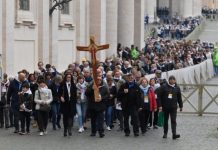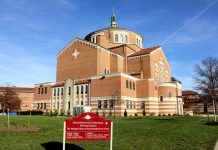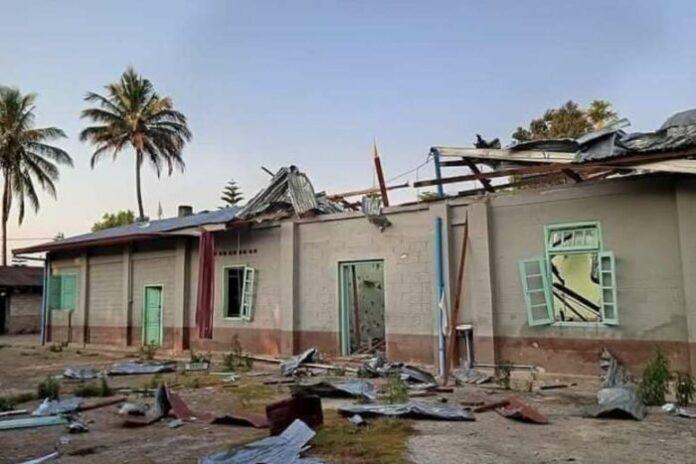Departing Nuncio of Myanmar, Archbishop Paul Tschang In-Nam, issues an appeal before leaving to take up a new appointment in the Netherlands.
Newsroom (06/09/2022 12:50 PM Gaudium Press) Archbishop Paul Tschang In-Nam, the outgoing apostolic nuncio of Myanmar, has urged the country’s Catholic community to increase efforts to support the rising number of people left helpless by ongoing conflicts.
“These days we face the immense suffering of our brothers and sisters in Myanmar, the Church is called to be servants of God and to serve our brothers and sisters, especially for those in dire need,” said Archbishop Tschang, age73.
The South Korea-born prelate made the remarks during a thanksgiving Mass at St. Mary’s Cathedral on Sept. 2.
The Mass was part of a farewell ceremony for Archbishop Tschang, who also served in Thailand, Cambodia, and Laos for ten years. He was assigned to Myanmar after the Vatican established full diplomatic relations in 2017.
Pope Francis appointed Apostolic Nuncio to the Netherlands on July 16 this year.
“In this time of the trial of our brothers and sisters in Myanmar, Our Holy Father Pope Francis has been following the situation closely. He encouraged dialogue to find out the way for peace and reconciliation among all different parties in violence,” he said.
The prelate also hailed the local Church for its active participation in “humanitarian assistance to the needy and displaced people who have had to leave their homes and villages due to the conflict situation.”
The appeal from the Vatican diplomat comes as the Southeast Asian nation faces a multi-pronged humanitarian, political, and economic crisis following the last year’s military coup that overthrew the elected government of Aung San Suu Kyi’ National League for Democracy.
Myanmar’s junta has cracked down hard on anti-coup protesters and renewed fighting with ethnic rebel groups, including those in Christian-majority regions like Kachin, Kayah, Karen and Chin, and central Myanmar’s Bamar heartland.
Military offensives with airstrikes and artillery shelling have destroyed villages and killed hundreds of civilians. Churches, Church-run facilities, and Christian villages have been attacked and badly damaged.
More than 2,200 people, including scores of children, have been killed, and the junta has detained over 15,000 people since the coup.
Catholic bishops have provided shelter and food to internally displaced people (IDPs) and called on the junta to allow humanitarian access to the displaced communities. The bishops have also called on the military to respect human dignity and places of worship, hospitals, and schools.
Pope Francis visited Myanmar in 2017. He made repeated appeals for peace and reconciliation and humanitarian corridors for those fleeing violence.
During the thanksgiving program, Archbishop Tschang said he conveyed “the fatherly love and prayer” of the pope to the people of Myanmar. He said working for the Church in Myanmar was “a special privilege.”
Cardinal Charles Bo accompanied him during the program and other bishops, priests, religious, and laypeople.
Cardinal Bo hailed Archbishop Tschang “as a great shepherd who worked hard to lead the Myanmar Church and a faithful shepherd who was willing to spend a lot of time getting to know the people of Myanmar.”
The cardinal said that during Archbishop Tschang’s tenure, the Myanmar Church witnessed historical events such as the appointment of its first cardinal, celebrations marking 500 years of Catholicism in the country, and the visit of Pope Francis.
Catholic officials say the Church has been at the forefront in serving conflict-torn communities. In collaboration with Karuna (Caritas), affected dioceses, including – Loikaw and Pekhon in Kayah state – have been providing food and non-food essentials to people, regardless of race and religion, for months.
A diocesan official from Loikaw said the Church had provided food, shelter, medicines, and healthcare awareness among the IDPs.
“The diocese-run relief committee and Karuna have collaborated to respond to the needs of people whose numbers are increasing despite funding shortfalls and restrictions on access to provide humanitarian assistance,” the official stated.
Church sources say roughly 50,000-100,000 IDPs receive food aid from the Church, adding that exact figures of IDPs and church-run facilities cannot be disclosed due to security reasons.
- Raju Hasmukh (With files from UCAN News)

































